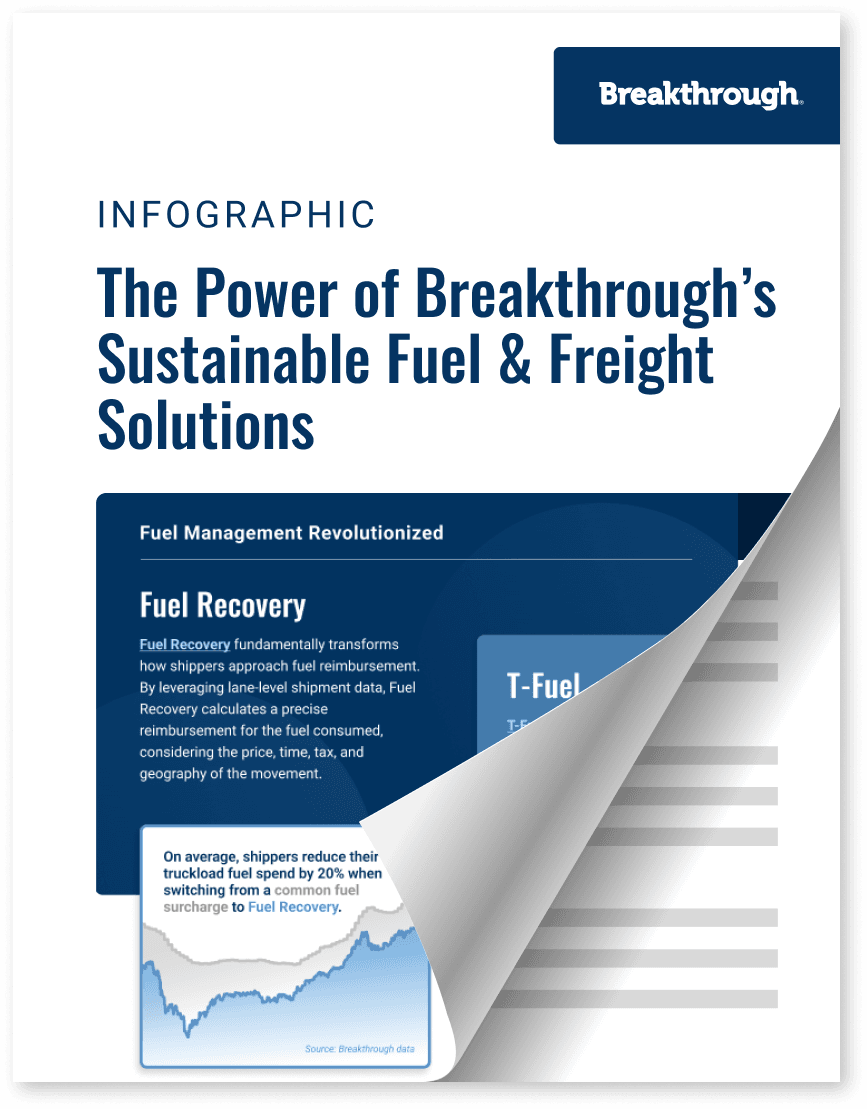The Power of Breakthrough's Sustainable Fuel and Freight Solutions

Freight
3 min read
July 17, 2024
Market Events
4 min read
July 16, 2024
Market Events
3 min read
July 8, 2024

4 min read
December 28, 2023

Share:
Global energy markets continue to remain volatile, pushing the spread between the Department of Energy (DOE) weekly index for diesel fuel prices and the cost of wholesale diesel to over 100 cents per gallon in the first half of December. Breakthrough considers this spread, or difference between the DOE weekly index and the daily cost of wholesale diesel, to be an advantage for shippers to reimburse carriers closer to the reality of fuel procurement. For the first time in Breakthrough history, we experienced an over 100-cent spread for fifteen consecutive days, with the highest spread being 150.83 cents on December 12, 2022. This contributed to the 102.08-cent spread average during December. In our December Advisor, we published that 11 of the 48 contiguous states saw average monthly spreads of over 100 cents. These critically high spreads are most likely causing you to ask two questions:
The Federal Reserve continues to raise interest rates to slow consumer spending. According to its median forecast released December 14, the Federal Reserve is expected to reach Federal funds rate as high as 5.1% in 2023. The December 14 meeting reflected a raise of interest rates by half a point, which brings the rates to the highest they’ve been in 15 years. This caused downward price pressure throughout the market as consumers fear a looming recession. In the long term, the Federal Reserve aims to achieve a 2% inflation rate, but as of the December 2022 release, we are at 7.1%.
China, the world's largest importer of crude oil, demanded less crude oil in November because of rising infections and tight restrictions. This caused downward price pressure throughout the global market as inventories were able to build. However, protests triggered by a deadly apartment fire sparked government interest to re-evaluate the policy and provide some normalcy since the commencement of COVID-19. If they loosen their regulation, we could foresee upward price pressure due to an increase in their oil demand.
Ongoing market events including decisions by OPEC+, the European Union (EU), and G7 continue to influence the ebbs and flows of the oil market. On December 4, OPEC+ met and decided to maintain production levels, putting slight downward pressure on the market. The following day, December 5, the EU ban on imports of seaborne Russian crude oil exports took effect. While the EU will continue to use existing Russian import inventories through the end of 2022, a logistical shuffle is occurring to supplement the difference. We are beginning to see upward price pressure in the market because of the reorganization. On the same day as the EU ban took effect, G7 decided to implement an oil price cap of $60 per barrel on Russian crude. While the price cap has yet to greatly impact Russia, who is already trading below the cap, it could add upward price pressure in the future. Some European countries are requesting the price cap to be lower to inflict pain on Russia sooner, even though it would likely apply upward price pressure globally as Russia could cut production in retaliation. China, India, and Turkey will continue to buy discounted Russian crude.
While the coming year is difficult to accurately predict, we are expecting 2023 to remain volatile as any event drastically impacts the delicate market. We significantly decreased our near-term forecast after crude oil prices and diesel’s high price premium fell because of expectations for slowing economic growth and China’s COVID restrictions in November. Lingering energy market uncertainty could make the steep decline in transportation energy prices temporary. Europe’s forthcoming ban on Russian refined products (February 5) and continuing pressure in the global crude oil market could see upward price pressure and volatility return to the market.
Breakthrough continues to provide monthly Breakthrough Advisors on the energy and freight markets, in addition to monthly webcasts. For more information on how to obtain these Advisors or receive the invites to the webcasts, please email info@breakthroughfuel.com.

3 min read
July 17, 2024
Maximize transportation efficiency with cohesive fuel and freight strategies. Discover the power of enhanced visibility, cost-effectiveness, and sustainability.
Read more
4 min read
July 16, 2024
Discover how the recent elections in Mexico and the EU are expected to influence energy policies, fuel prices, and dynamics in the transportation sector.
Read more
3 min read
July 8, 2024
Understand the state-specific changes in diesel tax rates and explore strategic solutions for shippers to accurately calculate fuel reimbursements to carriers.
Read more